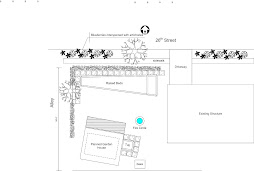I come from two families of farmers, so using words like 'permaculture' and thereby occasioning questions from people who have vastly more time growing food than I do is a little embarassing to me, but I like the idea enough to stick it out there for consideration nonetheless.
Permaculture is shorthand for a way of food gardening which prioritizes perennials and seeks long-term sustainability using a minimum of inputs such as water, fertilizer, etc.
By contrast the type of gardening I've done for most of my 46 years has been based upon annuals and (much to the chagrin of my aching back!) has also involved lots of moving of earth, weeding, planting and replanting, watering, etc.
In nature, ground left to do as it will over a period of years naturally undergoes a succesion from annual species such as grasses, 'weeds', etc. through to perennials and finally to taller woody plants and trees. By contrast, most farms and vegetable gardens involve annuals: peas, carrots, beans, grains, etc. This means that each year ground that would otherwise mature through a natural succession ending in forest, must be artificially kept in a state of successional immaturity. Not surprisingly, keeping it that state of unnatural immaturity takes a lot of effort in the form of weeding, fertilizing, watering, etc.
Here's the good news: there's another way to grow food!
Gardening using permaculture principles involves creation of more 'natural', mature plant and animal communities centered on perrenials. The result is less need for the inputs (labor, water, fertilizer) required by traditional annual gardening. The plant communities or 'guilds' used in permaculture ideally work together to create self-sustaining systems. Overstory plants, for example, offer shade which reduces need for watering. Big leafing, deep rooters like comfrey pull minerals up from below and then leave them on the surface in the form of mulch to feed shallow-rooters above. Nitrogen fixing perrenials like locust trees make the soil richer for annuals. Flowering plants attract polinators for all species, etc. etc.
I'm strongly attracted to any model of gardening which means less work! My interest in permaculture arose largely from recent years of experience building and watching native plant based (non-food) gardens grow. I saw how they required so much less input than my traditional beds and how they had a special wild grace of their own. Permaculture offered a way to do that with food crops, so I thought I'd give it a try.
You can read a lot more about permaculture here.
Sunday, November 30, 2008
Subscribe to:
Post Comments (Atom)

No comments:
Post a Comment